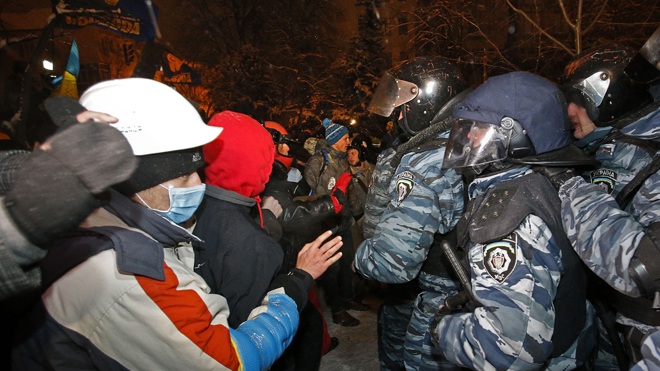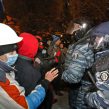
Ukraine: Waiting for a ‘Washington, with a new and righteous law’
Publication: Eurasia Daily Monitor Volume: 11 Issue: 10
By:

Following the winter holiday break, the Ukrainian parliament—the Verkhovna Rada—reconvened and, on January 16, passed perhaps the most controversial set of bills in the country’s history. These bills were subsequently signed into law by President Viktor Yanukovych on January 17. The controversial legislation allows the authorities not only to disperse protesters, but also to substantially curtail democracy. Moreover, Yanukovych fired Chief of Staff Serhiy Lyovochkin, who was believed to have opposed the use of force against protesters (https://www.unian.ua/news/617862-yanukovich-zvilniv-lovochkina-z-posadi-glavi-administratsiji-prezidenta.html). The draconian laws may provide Yanukovych with a minor advantage over opposition parties in the 2015 presidential race. But damage from their passage seems to far exceed this gain as the legislation may spur further deteriorating of democratic governance institutions and thus trigger the further escalation of Ukraine’s political crisis.
The anti-protest laws were passed unexpectedly by the pro-Yanukovych Rada majority, right after a vote on the 2014 State Budget Law, using a simple show of hands instead of the normal electronic voting procedure, which opposition deputies had earlier tried to physically obstruct (https://www.kommersant.ua/doc/2385070). The laws forbid virtually all types of tactics that Maidan protesters have been employing successfully: wearing protective gear, helmets and camouflage at rallies; driving cars in protest convoys known as Automaidan; as well as occupying public and civic office buildings. Another law passed that day virtually acquitted the officials and police responsible for the violent November 30, 2013 Maidan crackdown.
Furthermore, many legal provisions mirror similar regulations recently passed in Russia. These include applying the “Foreign Agent” rule and removing the non-profit tax status for non-governmental organizations that receive international funding; condemning “Fascism,” with apparent reference to Ukrainian nationalists; requiring electronic media to officially register, in addition to other freedom-of-speech limitations; introducing the right to block access to certain Internet resources; allowing control over the use of social networks; and adopting harsh libel laws. According to the Russian TV Internet outlet “Dozhd,” most of these Ukrainian sanctions were even tougher than ones in Russian legislation (https://tvrain.ru/articles/vzbesivshijsja_printer_po_ukrainski_verhovnaja_rada_prinjala_zakony_kotorye_esche_zhestche_rossijskih-360777/).
These new laws sparked an outcry in Ukraine and a cascade of negative reactions internationally (https://maidantranslations.wordpress.com/2014/01/17/international-responses-to-new-crackdown-laws-maidan-diary/). Former Fatherland party deputy Anatoliy Hrytsenko announced on January 17 that he would leave the Rada in protest over the passage of the undemocratic laws (https://www.unian.ua/news/617723-gritsenko-zdae-deputatskiy-mandat.html). One Party of Regions (PR) representative hinted the laws might be put to another vote (https://uapress.info/uk/news/show/14161), while PR defector Inna Bohoslovska suggested half of the party’s deputies were “outraged” about being manipulated and not knowing what they had voted for (https://www.pravda.com.ua/news/2014/01/16/7009735/).
The domestic opposition’s response to the passage of the Rada laws has varied in intensity. From behind bars, Yulia Tymoshenko called on her supporters to initiate a drawn-out legal appeals process that would eventually raise the case all the way to the European Court of Human Rights (https://batkivshchyna.com.ua/news/open/399). In contrast, one of the Maidan protest leaders, former interior minister Yuriy Lutsenko, in the hospital after fights with riot police on January 11, encouraged the creation of a nationwide resistance movement and for activists to “assault the ruling gang” (https://www.pravda.com.ua/articles/2014/01/17/7009798/). A more moderate group of civic society organizations prepared a petition letter on January 17, calling for national mobilization and resistance (https://civicua.org/news/view.html?q=2163626).
While a society-wide Ukrainian “Solidarity” movement is yet to emerge, radicalism and discontent have been growing. Nonetheless, the current situation in Ukraine after a long holiday season is marked by a worsening position among all the key players. The Maidan protesters have come under growing pressure from the authorities. Their protest camp in Kyiv and the occupied buildings around Independence Square experienced periodic disruptions in utility services during January 5–6, while traffic police and the courts harassed leaders of the Automaidan car rallies in legally dubious ways (https://www.pravda.com.ua/news/2014/01/15/7009622/). The impression of a looming crackdown by the authorities point has been growing.
For months, President Yanukovych chose to ignore the Maidan protests. But the lack of action on his part also allowed for growing radicalism and violence. Several violent incidents occurred in the past several weeks, including the beating of activist Tetyana Chornovol on December 25 (https://www.euronews.com/2013/12/25/anti-government-journalist-tetyana-chornovol-beaten-up-in-ukraine/). On January 11, Yuriy Lutsenko was beaten by Berkut riot police in a night clash initially spurred by protests led by a radical branch of the nationalist party Svoboda. After Berkut used force, over a thousand protesters and Kyiv residents blockaded two riot police buses for several hours at night, letting them free only after forcing officers to remove their masks and helmets and hold up their IDs to be filmed (https://www.bbc.co.uk/news/world-europe-25692076). The growing police discontent is likely to hurt future negotiations between the government and the opposition demonstrators. From the beginning of 2014, Yanukovych made no meaningful public statements to address the situation until early this week. On January 13, his office denounced a Ministry of Culture letter that had threatened to review the official registration of the Greek Catholic Church for its role in leading public prayers at EuroMaidan (https://www.president.gov.ua/news/29932.html).
The continued stalemate is also clearly weakening the government’s public support and its negotiating position with Moscow. On January 15, President Yanukovych asked Deputy Prime Minister Yuriy Boiko to speed up joint projects with Russia (https://www.president.gov.ua/news/29937.html)—a sign that they have little chance of being implemented unless Kyiv allows for Russian takeovers of Ukrainian businesses. That same day, Yanukovych also met with Prime Minister Mykola Azarov, emphasizing the need for social spending increases and insisting on a swift passage of the State Budget Law (https://www.president.gov.ua/news/29941.html). The State Budget was, thus, hastily agreed to by the Rada Committee overnight and passed without any questions or comments in the parliament. But the maneuver cast doubt on the wisdom of accepting the Russian financial support and fueled rumors of Yanukovych’s “unwritten covenants” in the Russian debt deal.
The political opposition has also grown weaker by the continued political crisis, and internal conflicts have begun to divide them. Opposition party leaders Arseniy Yatseniuk of the Fatherland party and Vitaliy Klichko of UDAR will probably run separately in the 2015 presidential elections (https://voiceofrussia.com/2014_01_10/Presidential-elections-in-Ukraine-may-lead-to-EuroMaidan-split-3029/). Meanwhile, Yatseniuk also failed to resolve the conflict with his fellow critic Hrytsenko, who subsequently left the Fatherland party on January 14 (https://en.interfax.com.ua/news/general/185681.html).
In 1857, in an unfinished poem (https://litopys.org.ua/shevchenko/shev2110.htm), famous Ukrainian poet Taras Shevchenko condemned Tsarist Russia’s suppression of Ukrainian liberties and prophesized the eventual emergence of a Ukrainian George Washington, who would arrive “with a new and righteous law.” Ukrainians still have a long and laborious road ahead to fulfill Shevchenko’s prediction, though their growing determination and ability to learn from their mistakes give reason to be optimistic.




